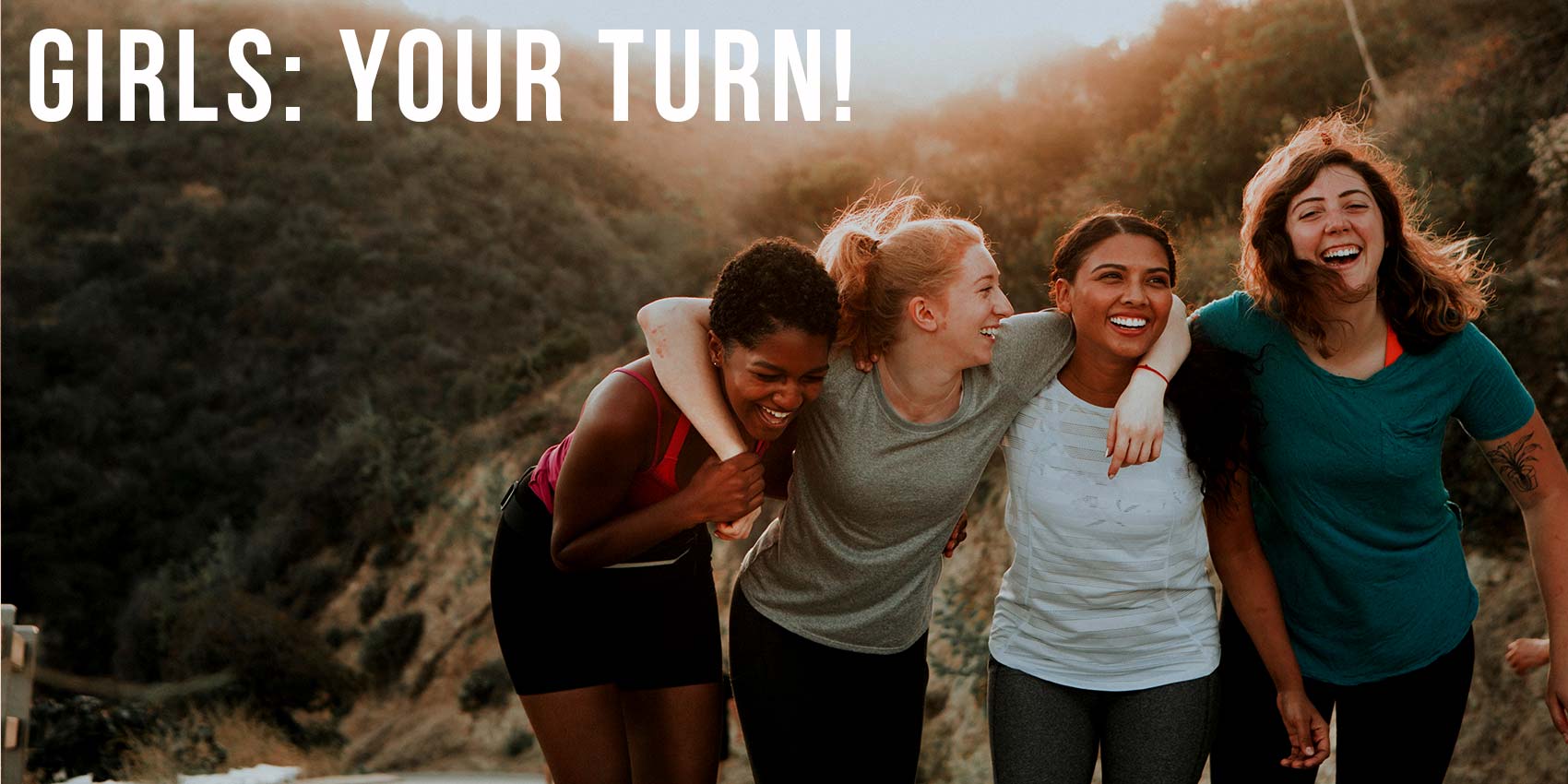26 Nov Girls: your turn!

Here is where you will get the basic scoop on what happens during puberty for girls.
The average age of puberty onset for girls is between 10 and 14 but seriously, averages can sometimes freak people out. Some girls begin puberty much earlier (like age 7!), while some girls don’t get their periods until age 17. (Source: https://www.medicinenet.com/puberty/article.htm) Getting your period is just one sign of puberty, and often the biggest “deal” for girls. Puberty itself begins before you get your period and involves a number of bodily changes that move you into womanhood. Just read on….
Your weight: Guess what? If you are a girl, you will probably put on weight. That’s a good thing as you have to gain weight (and eat well!) because your body is laying down health tracks for the rest of your body’s life.
The food you give your body is the fuel your body will use to make all these changes happen properly and successfully.
(What food choices are you making for your body?)
Your boobs, hips and curves: As your breasts begin to grow you may first notice a tender lump appear beneath your nipple. This is common and not something to cause alarm. Your boobs may also become tender (like right before and during your period), they might swell and you may feel like a watermelon display just landed on your chest – or you may not. Everyone is different.

DID YOU KNOW? The milk from a nursing mom’s breast is made in your body from what liquid? If you guessed blood, you’re right. And what causes all that swelling before your period? Right again: those milk ducts you have in there increase in number and size to store the extra blood pumped to them.
Your hips will grow too. They provide the passage-way for if or when you give birth. Between the changes to your hips and the changes to your boobs, you will begin to have some shape to your body. You also will reach your adult height approximately two years after you start your period. Love that body!!

DID YOU KNOW? Many cultures view the size and shape of a woman’s hips and breasts as a sign of fertility.
Your period: Don’t panic! Getting your period is a sign of a healthy body. Everybody is different, but your first period usually comes about two years after you first begin to see changes in your body OR right around the time your pubic hair looks full OR when hair begins to grow under your arms (see? EveryBODY is different!). Your period happens approximately each month. Why? Because your body provides an opportunity for pregnancy roughly once a month and your uterus (the place where a baby grows during pregnancy) accumulates blood in preparation for keeping a baby warm and nourished.
When no embryo (the cells that grow into a baby) is present (the female’s egg has not been fertilized by a male’s sperm) then the lining sheds itself—because it is not needed. Blood exits your body through your vagina. This shedding of blood results in a female’s monthly period, and is often referred to as menstruation. It can last anywhere from two to ten days. If your period only lasts a day or two at first and then you don’t get it again for months, don’t panic. This is normal. You can always talk to a doctor about these things, but you don’t have to visit a doctor because you got your period. However, most doctors suggest you visit an OBGYN before you head to college, or roughly around age 18 and DEFINITELY before you become sexually active.
Here’s what happens in a little more fun detail. Your female internal organs consist (in short) of your ovaries, fallopian tubes, uterus, cervix and vagina. You have two ovaries that store eggs, one on either side of your uterus. The fallopian tubes provide a little pathway for the eggs to travel to the uterus.
Each ovary in your body has several hundred thousand eggs in it. Each month a voice comes over the ovary-intercom that says, “Egg #12—come on down! You’re the next contestant on ‘Let’s make a baby’!” An egg then travels from the ovary down the fallopian tube and into the womb (uterus) to grandmother’s house you go (you are paying attention, right?). If the egg is not fertilized (by the sperm that men create), then the hormone levels fall and you shed that baby-holding lining (discussed above). Then what happens? You guessed it. You get your period. (Note: you know there really are no actual ovary-intercoms, right? Just checking.)
Hormones!!: You, as a maturing lady, are producing hormones now faster than you can text. During puberty, many hormones come into the picture and each one has a job to do. But together they work to make you a woman. That’s the good news. The bad news is these hormones can often make your mood swings wild and unpredictable—sort of like you are on a roller coaster ride. Hormones can also cause skin issues (yes, pimples) and even difficulties in concentrating at times. Be patient though, in time, everything will settle down into a new, more mature you, and lots of that negative stuff will go away. The key in learning this is to use the knowledge to your advantage! If you feel like biting everyone’s head off just because they look at you funny during that time of the month, now you understand why and maybe you’ll cut them and yourself some slack.

DID YOU KNOW? How many children did the woman who had the most children ever, have? 69! She did this with 27 pregnancies! Count ‘em: 16 pairs of twins, 7 sets of triplets and 4 sets of quadruplets.




Post Question:
What was the first sign that you were starting puberty? How did you feel?
Answer the post question here
What's being said